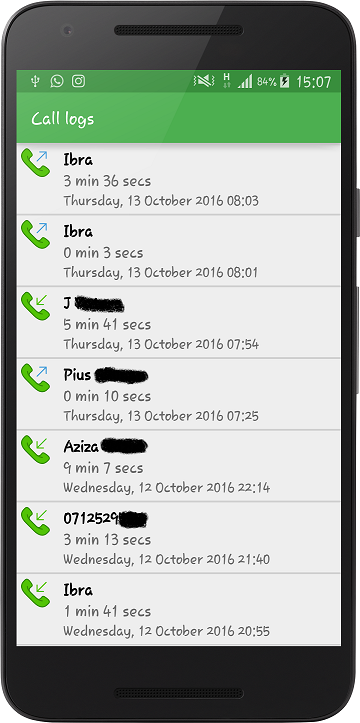Download
Step 1. Add the JitPack repository to your build file
Add it in your root settings.gradle at the end of repositories:
dependencyResolutionManagement {
repositoriesMode.set(RepositoriesMode.FAIL_ON_PROJECT_REPOS)
repositories {
mavenCentral()
maven { url 'https://jitpack.io' }
}
}Add it in your settings.gradle.kts at the end of repositories:
dependencyResolutionManagement {
repositoriesMode.set(RepositoriesMode.FAIL_ON_PROJECT_REPOS)
repositories {
mavenCentral()
maven { url = uri("https://jitpack.io") }
}
}Add to pom.xml
<repositories>
<repository>
<id>jitpack.io</id>
<url>https://jitpack.io</url>
</repository>
</repositories>Add it in your build.sbt at the end of resolvers:
resolvers += "jitpack" at "https://jitpack.io"
Add it in your project.clj at the end of repositories:
:repositories [["jitpack" "https://jitpack.io"]]
Step 2. Add the dependency
dependencies {
implementation 'com.github.wickerlabs:CallLogs:1.09'
} dependencies {
implementation("com.github.wickerlabs:CallLogs:1.09")
} <dependency>
<groupId>com.github.wickerlabs</groupId>
<artifactId>CallLogs</artifactId>
<version>1.09</version>
</dependency>
libraryDependencies += "com.github.wickerlabs" % "CallLogs" % "1.09"
:dependencies [[com.github.wickerlabs/CallLogs "1.09"]]
Readme
Call Logs - Android library for accessing device call logs

Installation
Step 1. Add the JitPack repository to your root build.gradle file.
allprojects {
repositories {
...
maven { url "https://jitpack.io" }
}
}
Step 2. Add the library dependency to your app build.gradle file
dependencies {
implementation 'com.github.wickerlabs:CallLogs:1+@aar'
}
Step 3. Handle permissions (For API 23+)
For those targeting API 23+,
you should handle the runtime permissions for READ_CONTACTS and READ_CALL_LOG.
As a reference, check out the sample app in the repository.
Other than that, permissions are automatically added to the manifest file.
Usage
-
Initialization
LogsManager logsManager = new LogsManager(context); -
Getting a list of call logs
List<LogObject> callLogs = logsManager.getLogs(type);- Available list types :
>
> LogsManager.INCOMING_CALLS: for getting the list (LogObject) of all the incoming calls. >
> LogsManager.OUTGOING_CALLS: for getting the list (LogObject) of all the incoming calls. >
> LogsManager.MISSED_CALLS: for getting the list (LogObject) of all the incoming calls. >
> LogsManager.ALL_CALLS: for getting the list (LogObject) of all the calls.
- Available list types :
>
-
Getting call durations
logsManager.getIncomingDuration(): returns the number of seconds for all the incoming calls made.
logsManager.getOutgoingDuration(): returns the number of seconds for all the outgoing calls made.
logsManager.getTotalDuration(): returns the number of seconds for all the calls made.
logsManager.getCoolDuration(type): returns a String in the form of "x hrs xx mins" or "xx mins xx secs"
- Available duration types :
>
> LogsManager.INCOMING: for getting duration for all the incoming calls. >
> LogsManager.OUTGOING: for getting duration for all the incoming calls. >
> LogsManager.TOTAL: for getting duration for all the calls.
Using LogObjects
-
Some useful methods
logObject.getDuration(): returns anintof the seconds used for that particular call.logObject.getNumber(): returns aStringof the number associated with the call made.logObject.getContactName(): returns aStringof the contact name for the number in the log, if not found, it returns the number.logObject.getType(): returns anintfor the type of the call log.logObject.getCoolDuration(): returns aStringin the form of "x hrs xx mins" or "xx mins xx secs" based on the duration.
Examples
-
Retriving a list of all call logs:
ListView logList = (ListView) findViewById(R.id.LogsList); LogsManager logsManager = new LogsManager(this); List<LogObject> callLogs = logsManager.getLogs(LogsManager.ALL_CALLS); LogsAdapter logsAdapter = new LogsAdapter(this, R.layout.log_layout, callLogs); logList.setAdapter(logsAdapter);
be sure to check out the sample app in the repository.
Acknowledgements
Icons made by madebyoliver from www.flaticon.com
